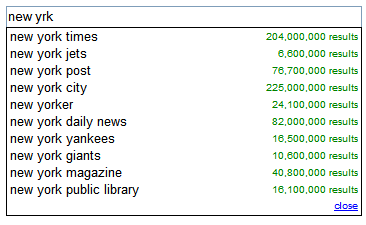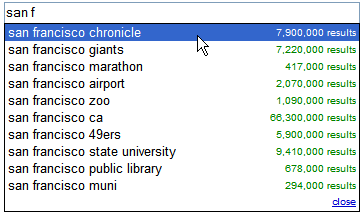Free SEO Tips for Google Search Suggest
Google announced that over the next week they are going to implement their Google Suggest search suggestion feature on Google.com. This change will help searchers find popular keywords that other searchers recently searched for.
Short Term Influence on Search
When this search suggest change is coupled with the recent launch of automatic matching and the new quality score update it may consolidate PPC competition against a smaller set of core industry keywords. Some outlier keywords, like misspelled terms, are going to be much harder to build a traffic stream from.

This will also likely have the effect of focusing organic search attention on a smaller set of well defined queries. And the extra competition in the PPC space will drive yet more competitors to adopt SEO practices. But as an SEO smarter than 99.9% of other web publishers, you have some profitable drafting opportunities you can use to build a profitable search traffic stream. :)
SEO Drafting Tips
- Search Query Drafting: If you can create a brand that starts with and industry keyword and drive search volume on it then your brand can show up for some people looking for the broader topic. For example, a webmaster may not have enough PageRank/link authority to rank for seo, but if they can create enough hype around their brand then maybe people search for it and their brand related search query shows up as a suggestion around the broader search queries. This is something that should also be taken into consideration when coming up with official names and page titles for leading resource oriented linkbaits.
- Brand Drafting: If SEO Book is a decently strong brand and a fairly generic keyword, and SEO Books is the second most popular term suggested right below it then you might be able to pick up some of that search volume by ranking at or near the top for that alternate version. An April Hitwise blog post showed that in the US nearly 15% of brand related queries were intercepted by third part websites, and that was *before* Google launched search suggest directly on Google.com.
- Brand Coupon/Discount Drafting: This is an extension of the above type of drafting, but rather than creating a compilation of sorts you focus on getting an affiliate commission for offering consumers a discount on the core brand. Many consumers will be reminded that there are coupons, discounts, promo codes, and reviews to find and read through when reviewing popular brands.
- Media Drafting: This technology is already live on Youtube, so Youtube presents 4 ways to draft popular media.
- create a video optimized for a phrase that is already popular on YouTube
- create a video optimized for a phrase where you think the video has a good chance of ranking high in Google results
- create a video that has a title similar to other popular YouTube content that is watched by hundreds of thousands or millions of people
- create a relevant video that is a video reply to a video that is already well received
Long Term Influence on Search
- For websites and businesses that have no intent of building a real brand and intend to run primarily as an organic search arbitrage player the significance of domain name may be lowered significantly.
- As people get more acclimated with using search to navigate the web (as many people already do) then some brands and domain names that seemed too long and not viable may become viable marketing platforms.
- Conversely, short acronyms may lose some of their value as people become acclimated to having the search engine help complete their search queries.

Your Turn
How do you see search suggestion influencing how we search and how we write?




Comments
If I had to sum the effects of search suggestion up in a blog post title it might be:
"Long Tail Finally Cut Off"
Rob
"Long Tail Finally Cut Off"
Yes and no. This cuts of the semi-long tail of generic key terms but the long tail is wide open. If you are searching for something specific that has more than 3 words chances are the "suggest" feature will run out of suggestions. There is no way it can keep up with all the permutations out there.
I don't see this as killing the long tail. If people are typing in a long well-defined query, they already know what they want. I see this as going the other way, and hitting the broad searches. Someone types in one word not sure what modifiers to add to it and Google suggests more clear queries. The user looks through the list and finds the modifiers he was looking for.
Ok, a little simplistic I know, but don't forget a large number of searchers still use one or two word queries (and then complain about the usefullnes of the SERPS. This gives these less verbose guys even more "influence" on what other searchers look for.
The herd mentality makes the suggested mid tail searches perpetually self promoting, making the real, diverse "user defined" terms less busy. A higher end 3 word term that has a 123 or 132 word order, will end up with only one of those terms which makes that market 50% smaller.
Just my ideas...
Search phrases that are already searched often, i.e. those that are suggested, will be searched even more often, rare search phrases will have less searches. There will be effects for the long tail, since many users will be satisfied with the suggested searches, instead of thinking about the best search phrase to find what they want.
Even though it tells you suggestions, people still type in the exact phrase they were going to anyways. If it suggests what they were going to search for, then they choose the suggestion. People go to the search engine with a thought in their head. I know half the people look at their keyboard when they type and will never even see the suggestions. Others will just type in a domain name in their browser. There is still a ton of type in traffic.
This change is good for SEO companies because that will create extra SEO demand.
I would agree that it will effect unstructured searches from which small websites get traffic but I don't think it will kill long tail because it still gives long tail suggestions but obviously the small websites will be challenged. This will lead to an explosion in paid links, and the social media advertising will increase tremendously. Comparison sites like Nextag, pricegrabber... will start getting some of that change too.
I just don't like the idea to be directed when I am searching. So there is also a high possibility that most people will turn it off, like myself :-)
i just noticed this myself when i was Google searching on Aug26th - we must be having a mindmelt, Aaron! thanks for giving some more details. really appreciate you.
when i was searching on squidoo i found a backlink to your blog post - check it out, http://www.squidoo.com/fast-indexing.
i'm going to post a backlink to this post also on my blog so my readers can get more details about the enhanced search features at Google.
http://free2bhip.blogspot.com/2008/08/whats-hot-with-bhip.html
cheers!
actually i dont see this impacting the long tail - it will just draw traffic away from the common short generics to more specifics - or am I all muddled because i had a beer?
If I had to guess I think many of the most generic phrases will lose traffic to slightly longer and more specific phrases, but that many of the longtail phrases will also cede search volume toward the middle tail terms.
So my friend told me he bought an iPhone for $30 online. I say where and conveniently he does not remember. Does my search end any sooner with google's suggested search?
Okay maybe another example -
I'm looking to buy a used Macbook Pro and I am trying to find the best deal. Does google's suggested options help me search any less?
One more -
I am trying to find out who holds the world record for making the largest fried chicken nugget. Does google's new tool help me find out the info I'm looking for any faster?
Currently Google Search Suggest is inferior to Yahoo!'s similar offering, but in time I would expect it to get better. Might not help with your first 2 questions, but would probably help with that last one. :)
Thank you for the comments regarding google's new search function. :)
So I am seriously considering joining your membership program based on the information in your site. If you could let me know what you consider a good amount of time (months) a member should continue with your program it may be the tipping point for me?
My expectations are not to learn everything and then just cancel, I know how frequently strategies change. But at some point there is a plateau and it is time to move on.
As far as your response to my question please assume my knowledge of SEO, SEM & PPC is "good", but my goal is to be an authority (at least in my own mind :) ).
I think you can learn a lot in a month or two if you already have a strong base.
Thanks Aaron :)
Look for my account in the next week or so. I would probably want to build some relationships with the forum section so expect to see me around longer than a couple of months.
I am really looking forward to learning from you :D
Chris
In the olden days, before dinosaurs, people would frequently use short-tail, but soon learned that this isn't effective for providing good quality results.
More and more research points to people using more specific long-tail terms each year doesn't it? From what I've read it does, anyway.
The idea that Google Suggest is going to chop-out the long-tail could be a prediction or it could be misguided - personally though, I'm not sure that it will happen to any worrying extent. People are moving away from short-tail having learned that they are seeing the results that they expect.
I just want to return to a point, quoting myself, "this isn't effective for providing good quality results" ...and say that good results provide a greater incentive to link back to that source. More generic search terms point to the big-boys of the industry (essentially those with the budgets and resources, to essentially buy-out SERPs), but the real nuggets can be found much more easily in short-tail, people like to link deeper to long-tail content as much as (or even more often) than a generic corporate site...any thoughts?
Capture a niche at a time, that's what I say.
I think people like to link to brands that dominate a niche because we like to associate titles and ideas and people with concepts.
But we also like to link to what is known and trusted...and in many instances people are more likely to link to a trusted known news brand than an unknown site with superior information (hence the success of the fairly watered down content on Wikipedia).
Yeah it's clear people will always link to a safe bet I guess, but I just wanted to make clear that in my humble opinion (as I'm newish to the SEO game - 2005/6!) that this still leaves the short-tail way open.
My feeders have been clogged with Google Suggest feeds (OK slight exaggeration!) but I don't think the end is nigh for short-tail like some suggest.
Thanks Aaron - great post by the way, it's certainly a big one to watch and creating a lot of interest by SEO-ers...
Add new comment